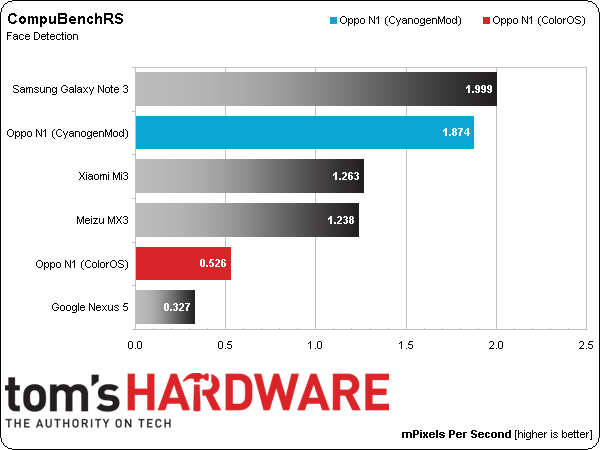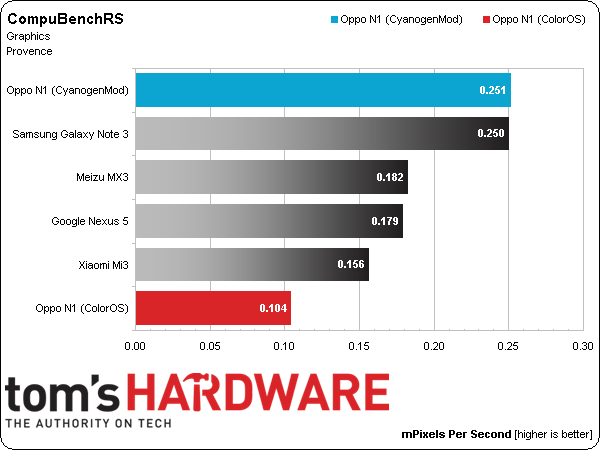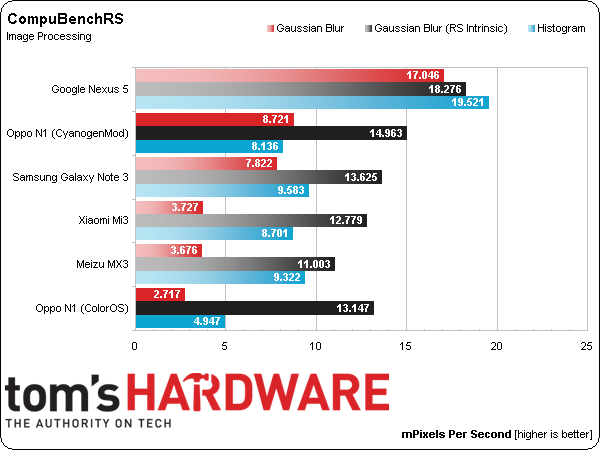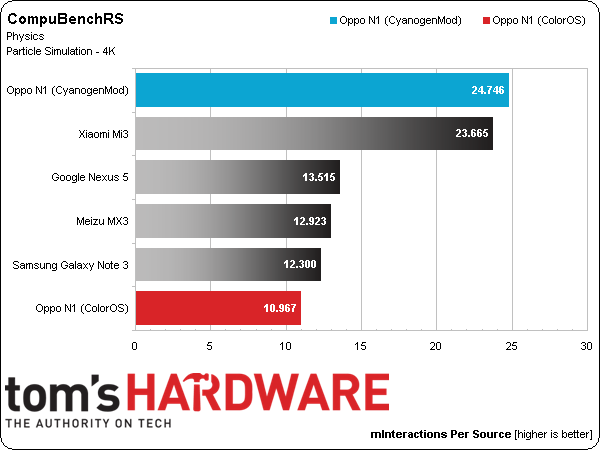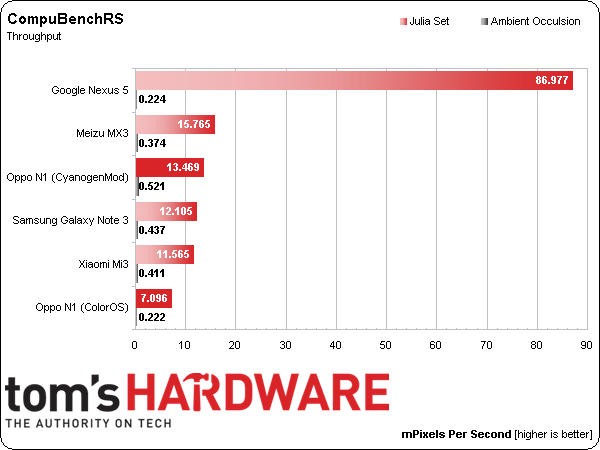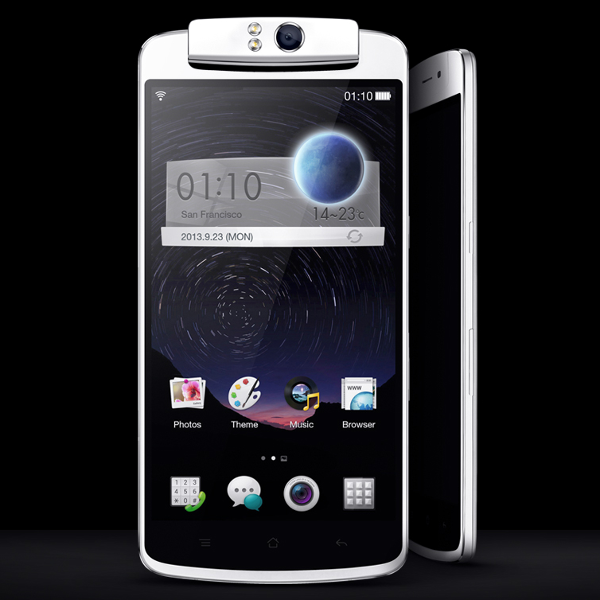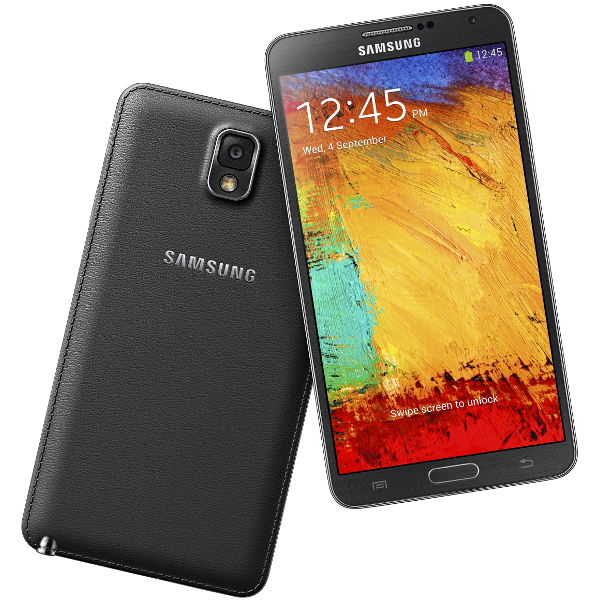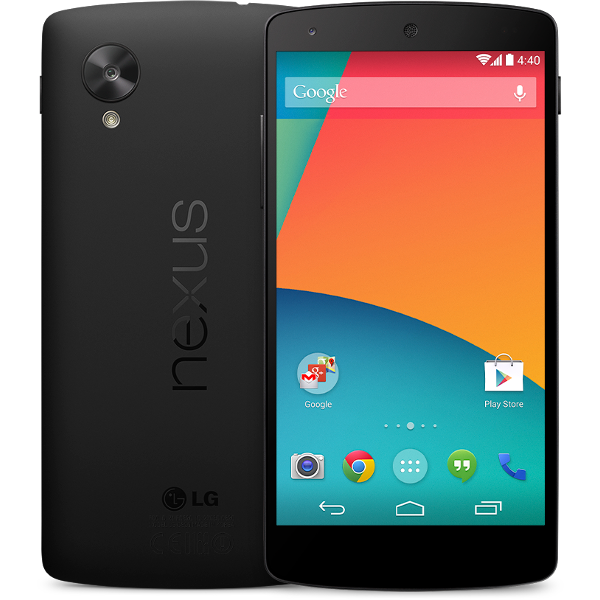Oppo N1 Review: Future-Looking Phablet Or Oversized Flop?
Oppo's N1 sports a unique pivoting camera, a large-format display, and two different operating system options. Are those features enough to make up for an older hardware platform and dicey software optimization in a sea of compelling competition?
Why you can trust Tom's Hardware
Results: GPGPU Benchmarks
CompuBench Mobile is a benchmark that tests the compute performance of multi-core systems supporting the RenderScript API, which is a component of the Android operating system. The compute API is similar to CUDA or OpenCL, and can distribute parallel tasks across all compute cores, including the CPU and GPU (as of Android 4.2, RenderScript is expanded to run on the GPU, in addition to the CPU of supported systems). On compute-capable GPUs, the benchmark runs on the graphics engine. Otherwise, the tests stress the CPU cores. The sub-tests cover the following categories: Computer Vision (Face Detection), 3D Graphics (Provence - ray tracing), Image Processing (Gaussian Blur, Histogram), Physics (Particle Simulation – 4K), and Throughput (Julia Set, Ambient Occlusion).
All devices tested meet the requirements for RenderScript support: a compute-capable GPU and Android 4.2 or higher.
The Note 3 can pick a familiar face from the crowd quickest. Oppo's N1 with CyanogenMod comes in second and shows that the Snapdragon 600 SoC is a capable computational engine.
Based on their extremely low scores, it appears that the N1 running ColorOS and the Nexus 5 don't leverage their GPUs. Both devices support RenderScript, so either the API is disabled or the included GPU driver doesn’t include support.
The N1 does well in the ray tracing test, tying Samsung's Note 3. Again, the Nexus 5 trails the Note 3 by a significant margin, despite sporting similar hardware. Likewise, the N1 running ColorOS is more than twice as slow as when it’s running CyanogenMod, unable to fully use all of its compute resources.
The Nexus 5 finally gets the memo extolling RenderScript's virtues as it posts the best scores in all three Image Processing sub-tests. The Note 3 falls behind the Nexus 5 with scores similar to the N1 running CyanogenMod. ColorOS, however, still fails to enlist the help of the N1’s Adreno GPU. Apparently, the Gaussian Blur (RS Intrinsic) test ran only on the CPU for all devices, since the ranking is similar to all of the other CPU benchmarks.
In the Physics test, the N1 (CyanogenMod) is back on top, outperforming both Snapdragon 800-based devices. It’s closely followed by the Xiaomi Mi3. Obviously, RenderScript support is broken in ColorOS.
Get Tom's Hardware's best news and in-depth reviews, straight to your inbox.
The Nexus 5 dominates the Julia Set Throughput test, showing more than four times the performance of the next-fastest device. After confirming this result with the CompuBenchRS online database, we contacted Kishonti (the benchmark’s developer) for an explanation. Kishonti stated that newer RenderScript drivers enable GPU acceleration for more tasks. The driver for the Nexus 5 apparently enables GPU support for the specific operations performed during the Julia Set test.
The remaining devices appear to run Julia Set solely on the CPU. Oppo's N1 with CyanogenMod utilizes all four of its Krait 300 cores while running this test. ColorOS only uses two of the four CPU cores for Julia Set, which explains why its score is roughly half of the value achieved using CyanogenMod. We saw similar behavior when running the Geekbench 3 Multi-Core benchmark. Clearly, ColorOS has trouble utilizing all four cores under heavy load, limiting the N1 to dual-core-like performance.
Current page: Results: GPGPU Benchmarks
Prev Page Results: GFXBench 3.0 Next Page Brightness, Black Level, Contrast Ratio, And Gamma-
wavetrex Just a small comment about OLED, even if this might not be the place to write about it.Reply
Probably due to to imperfections in the transistors that control the OLED pixels, there is a very faint but perceptible in deep darkness leakage of energy toward the pixels.
Yes, doesn't compare to the obvious light bleed of any TFT display, but the OLED "off" pixels are not truly off, they have a 0.00something-small level of light which could theoretically be measured by some very sensitive equipment.
The eyes are certainly capable of seeing it... -
InvalidError Putting both flash LEDs on the same side so close to the image sensor seems like a missed opportunity to me: putting one LED close to each hinge with the camera in the middle would provide more even lighting and softer shadows.Reply
With the mostly passable image quality, that would not help the N1 much though. -
Onus Please don't put the letters "p" "h" "a" "b" "l" "e" "t" together in that order and treat it like a word.Reply
-
WyomingKnott @onusReply
First time I read the term I had the image of holding my 10" Asus pad up to my face and talking into it. I suppose it's better than a shoe; cleaner, too. -
shahbaz200 Bad GPU, doesn't works well on this device, poor performance, other than that its good device.Reply -
BlankInsanity please respect my opinion, but I don't see why phones need to go bigger. i the 90s phones used to be huge and this was a problem for mobility and so as the years went by they created smaller form factor phones. Now here we are repeating that mistake. A phone is ment to make a small footprint when hidden on it's user such as a pocket. You don't put your tablet in your pocket, I don't see why'd you make a phone out of it. this is just my opinionReply -
jankeke "please respect my opinion, but I don't see why phones need to go bigger. i the 90s phones used to be huge and this was a problem for mobility and so as the years went by they created smaller form factor phones. Now here we are repeating that mistake. A phone is ment to make a small footprint when hidden on it's user such as a pocket. You don't put your tablet in your pocket, I don't see why'd you make a phone out of it. this is just my opinion "Reply
True but people couldn't watch porn on their phones back then so it made sense to make them as small as possible. Not so now ... ^^ -
Matthew DiGiacomo No offense Tom's Hardware but why are you reviewing this phone now? It's outdated and been on the market for almost 8 months.. No one really cares about it anymore.Reply -
falchard The Camera is a smart solution meaning you won't need 2 cameras. Obviously it will need tilt support to tell it which direction is up.Reply
No removable battery is a shitty solution. Its the issue all phones face after 2 years, their batteries no longer hold a charge. -
BlankInsanity Reply13717317 said:The Camera is a smart solution meaning you won't need 2 cameras. Obviously it will need tilt support to tell it which direction is up.
No removable battery is a shitty solution. Its the issue all phones face after 2 years, their batteries no longer hold a charge.
lol that's a scam the companies do to force you to buy a new one ;)
